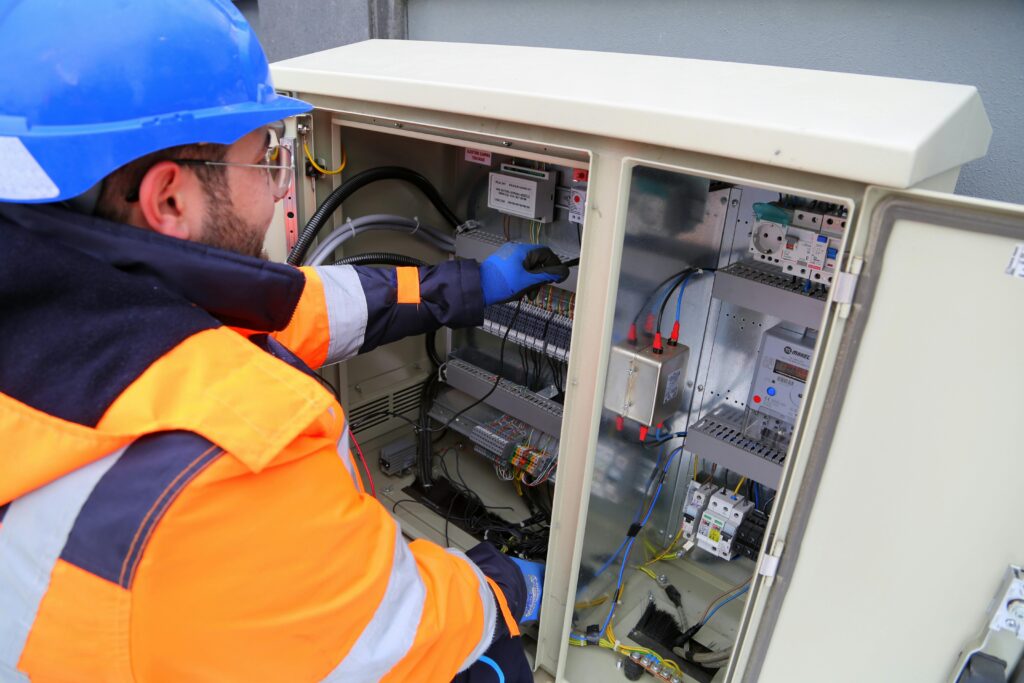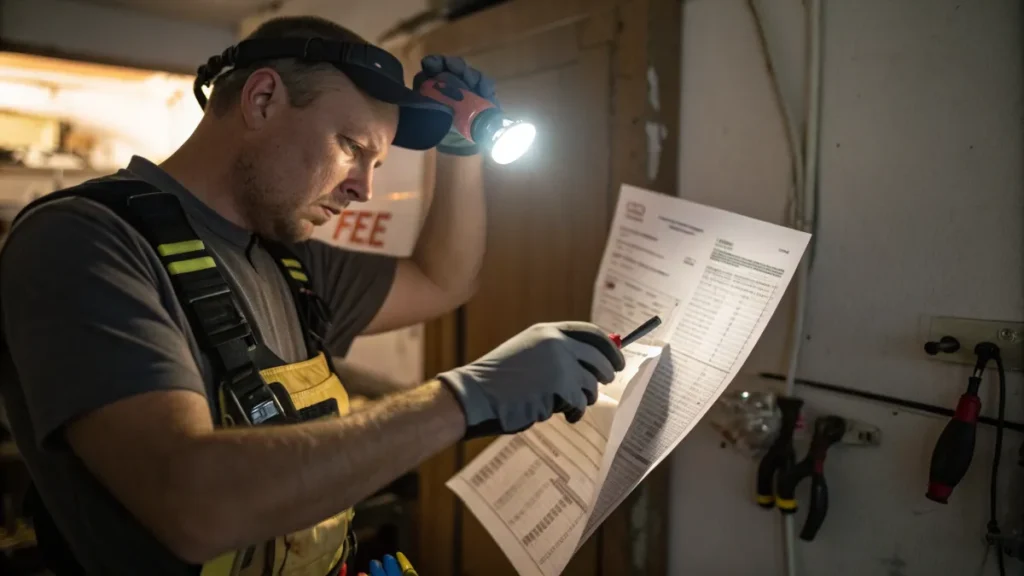Introduction
Business insurance for electrical contractors isn’t just a legal formality, it’s a fundamental shield that protects your livelihood, reputation, and assets. But what many contractors don’t realize is that some of the most damaging costs aren’t in the monthly premium, they’re buried in the fine print.
If you want to avoid unpleasant surprises, it’s critical to identify and plan for hidden fees that can creep into your insurance policy.
Uncovering the Real Cost of Business Insurance for Electrical Contractors
When reviewing insurance quotes, most electrical contractors focus on the base premium. However, this figure often tells only half the story.
The following breakdown reveals where additional charges typically hide when it comes to business insurance for electrical contractors:
Hidden Insurance Fees to Watch Out For
| Hidden Fee | What It Means | Financial Impact |
|---|---|---|
| Administrative Fees | Charged for policy setup, updates, or cancellations | Can range from R100 to R1,000 annually |
| Payment Plan Charges | Monthly or quarterly payment options may carry interest or service charges | Adds up over time—5%–10% more than annual payment |
| Deductibles | Your out-of-pocket costs when filing a claim | High deductibles reduce premiums but increase cash outlay during claims |
| Exclusions and Limitations | Specific job types or risks not covered by the standard policy | May require costly endorsements |
| Endorsements | Additional cover for tools, vehicles, or high-risk contracts | Common in commercial or municipal projects |
| Uninsured/Underinsured Motorist Cover | Required for employee-driven business vehicles | Rates vary by region and vehicle usage |

What Influences These Hidden Costs?
Many fees are linked to how insurers assess your business’s risk profile.
Key factors include:
Risk Assessment Criteria
- Safety Record: A history of claims or workplace incidents raises premiums.
- Number of Employees: More staff = higher risk = higher cost.
- Business Location: Urban vs. rural can affect liability and motor insurance.
- Specialisation: High-voltage or industrial work increases exposure.
⚡ Pro Tips to Reduce Hidden Fees on Business Insurance for Electrical Contractors
Here’s how savvy electrical contractors save thousands annually:
✅ Ask the Right Questions
- How often do premiums get adjusted?
- Are there fees for mid-term policy changes?
- What are the penalties for missed or late payments?
✅ Negotiate Like a Pro
Many insurers are open to discounts based on:
- Years of experience
- Proven safety protocols
- Bundling multiple policies (e.g., tools + vehicle + liability)
✅ Maintain a Low-Risk Profile
- Regular safety training for employees
- Up-to-date, compliant equipment
- Clean claim history
Make Informed Decisions About Business Insurance for Electrical Contractors
Securing business insurance for electrical contractors isn’t just about choosing the cheapest policy. It’s about understanding the true cost, hidden fees included, and making smart choices that protect both your finances and your future.
By being proactive, asking the right questions, and managing your risk profile, you can avoid nasty surprises and keep your business running strong, no matter what the job throws your way.

Key Types of Insurance Every Electrical Contractor Needs
As an electrical contractor, protecting your business with the right types of insurance is crucial. There are several key insurance policies that every electrical contractor should consider to ensure financial security and mitigate risks. Understanding these insurance types can aid you in making informed decisions about your coverage.
General Liability Insurance
This essential type of insurance protects against claims of bodily injury or property damage that may occur during your work. If a client claims that your electrical work caused an accident or property damage, general liability insurance can cover legal costs and settlements.
This coverage is particularly important for electrical contractors as they often work in clients’ homes and businesses.
Professional Liability Insurance
Sometimes referred to as errors and omissions insurance, this policy protects you against claims of negligence, misrepresentation, or inadequate work. If a customer feels that your work didn’t meet required standards or that you failed to deliver on promises, they may file a claim.
Professional liability insurance can help cover legal fees and any settlements.
Workers’ Compensation Insurance
If you have employees, workers’ compensation insurance is typically required by law. This policy provides benefits to employees who suffer job-related injuries or illnesses. It can cover medical expenses, rehabilitation costs, and lost wages.
In the event of a tragic accident, it can also provide benefits to dependents. Having this insurance not only protects your workers but also shields your business from potential lawsuits.
Commercial Auto Insurance
Your vehicles are essential tools for your trade. If you use trucks or vans for business purposes, commercial auto insurance is key to safeguarding your operation.
This insurance covers damages to vehicles, liability in the event of accidents, and can even cover your equipment as it is transported. Personal auto insurance may not cover incidents that occur while using your vehicle for work.
Equipment and Tools Insurance
Your tools and equipment are valued assets in your business, and they can be costly to replace if lost, stolen, or damaged. Equipment and tools insurance covers the repair or replacement costs.
Whether you have hand tools, electrical testing devices, or large lifting equipment, this insurance helps maintain your operational efficiency without breaking the bank.
Business Interruption Insurance
Unexpected events can halt your operations, whether due to natural disasters, fire, or theft. Business interruption insurance provides coverage for lost income during the downtime.
It can help cover overhead expenses, payroll, and any fixed costs you still incur while unable to operate. This peace of mind is invaluable to ensure that your business can resume quickly.
Cyber Liability Insurance
In today’s digital age, electrical contractors must also consider the risk of cyber attacks. Cyber liability insurance protects against data breaches and other cyber incidents.
If your business collects customer information or manages online transactions, this coverage can alleviate potential financial loss from hacking or data theft.
Requirements and Considerations
Insurance needs can vary based on local regulations, the size of your business, and the type of electrical work you perform. It’s essential to consult an insurance agent who specializes in contractor insurance.
They can help you understand specific requirements based on your unique business circumstances.
Video: Further Explanation on the Types of Business Insurance for Electrical Contractors
Costs of Business Insurance for Electrical Contractors
Understanding the costs associated with various business insurance for electrical contractors is crucial for budgeting effectively.
Here’s a simplified table of average annual costs for essential insurance types for electrical contractors:
| Insurance Type | Average Annual Cost |
|---|---|
| General Liability Insurance | $500 – $3,500 |
| Professional Liability Insurance | $800 – $1,500 |
| Workers’ Compensation Insurance | $0.75 – $2.00 per $100 of payroll |
| Commercial Auto Insurance | $1,200 – $3,000 |
| Equipment and Tools Insurance | $300 – $1,000 |
| Business Interruption Insurance | $1,000 – $3,500 |
| Cyber Liability Insurance | $1,000 – $4,000 |
Selecting the right insurance packages is vital for ensuring the longevity and success of your electrical contracting business. By investing in these essential policies, you not only protect your financial interests but also establish credibility and trust with your clients.

Common Misconceptions About Business Insurance for Electrical Contractors
When it comes to business insurance, many professionals, especially in niche industries like electrical contracting, often have a skewed understanding of what coverage entails. This can lead to pitfalls, resulting in inadequate protection or unexpected costs down the line.
Below are some common misconceptions about business insurance that every electrical contractor should be aware of:
Myth 1: All Business Insurance Policies Are the Same
One major misconception is that all business insurance policies offer identical coverage. In reality, coverage varies widely depending on the insurer, the type of business, and specific risks associated with the industry.
It’s crucial to review various policies and tailor them to fit your business’s unique needs. Generic packages may leave gaps in your coverage, which can be risky.
Myth 2: Business Insurance Is Too Expensive
Many business owners shy away from purchasing insurance because they perceive it as an unnecessary expense. However, consider the potential costs of a lawsuit, property damage, or employee injury without insurance.
Investing in business insurance for electrical contractors can actually save you money in the long run by protecting you from catastrophic losses.
Myth 3: Liability Insurance Covers Everything
Liability insurance is essential, but it’s often misunderstood. While it provides protection against claims of negligence, it does not cover everything. For instance, it won’t cover your property damage or equipment loss, which may require a specific policy like property insurance or equipment breakdown coverage.
Myth 4: My Homeowners Insurance Covers My Business
If you run a business from your home, you may think your homeowners insurance is sufficient. However, most homeowners policies have restrictions on business-related claims. It’s vital to secure a separate business insurance policy or a rider that specifically addresses your business needs.
Myth 5: Insurance Only Matters Once an Accident Occurs
Some individuals think that business insurance is only necessary after an accident or a claim. In fact, having insurance in place before an accident ensures that you’re ready for any liabilities. Waiting until after something goes wrong can leave you in a vulnerable position. Plus, many insurers require proof of coverage to initiate claims.
Myth 6: I Don’t Need Coverage if I’m a Sole Proprietor
Many sole proprietors believe they are exempt from needing business insurance, thinking their personal assets are safe. However, this is a dangerous misconception. As a sole proprietor, you are personally liable for your business debts and claims. Liability insurance is essential to protect your personal assets.
Myth 7: Coverage Is Fixed and Cannot Change
Another misconception is that once you purchase a policy, the terms and coverages are set in stone. In reality, your insurance needs can evolve as your business grows. Regularly review your policies to ensure you’re adequately covered, especially if you hire more employees, expand your services, or invest in new equipment. Insurers usually allow you to adjust your coverage as needed.
Myth 8: Small Businesses Don’t Get Sued
Many small business owners operate under the false assumption that they are too small to face lawsuits. Unfortunately, every business is susceptible to legal claims, regardless of its size. Protecting yourself with the appropriate insurance can mitigate these risks effectively. Establishing a solid legal defense can be costly without proper coverage!
Understanding Your Business Insurance Needs
Here’s a handy guide to types of insurance you might consider:
| Type of Insurance | Description |
|---|---|
| General Liability Insurance | Covers claims of bodily injury, property damage, and personal injury. |
| Professional Liability Insurance | Protects against claims of negligence and malpractice in professional services. |
| Property Insurance | Covers loss or damage to business property from incidents like fire or theft. |
| Workers’ Compensation Insurance | Provides coverage for employee injuries or illnesses related to their work. |
Understanding these misconceptions is vital for every business owner. Educate yourself about the different types of coverage available and evaluate your unique needs to ensure you have the proper protection in place. Recognizing the facts will empower you to make informed decisions about your business’s insurance needs. Don’t let misconceptions put your business at risk; secure the right coverage for peace of mind.

How to Choose the Right Insurance Provider for Your Electrical Business
Choosing the right business insurance for electrical contractors is a vital step in protecting your business, your assets, and your future growth. While the process may seem overwhelming at first, breaking it into simple, actionable steps can make it easier to find a provider that meets your unique needs.
Step 1: Understand the Risks of Your Trade
Insurance for electrical contractors must account for the specific risks of the job. Before speaking to any insurer, know what coverage is non-negotiable:
- Liability insurance – for accidents that may occur on-site.
- Equipment insurance – for stolen or damaged tools and machinery.
- Worker’s compensation – required if you employ staff, covering work-related injuries.
- Commercial vehicle insurance – for vans or trucks used in your daily operations.
Having this baseline makes it easier to assess what each provider can offer.
Step 2: Research the Right Insurance Providers
Not all insurers are created equal. Focus on those with proven experience in buisness insurance for electrical contractors.
Here’s what to look for:
- A strong track record of working with trades professionals
- Excellent customer reviews and testimonials
- Financial stability—check independent ratings like A.M. Best
The right provider won’t just offer you a policy; they’ll understand your business.
Step 3: Compare Policies Side by Side
Every provider offers different options for business insurance for electrical contractors.
Take time to evaluate:
- Coverage limits – Are they high enough for your biggest jobs?
- Exclusions – What’s not covered that you might assume is?
- Premiums and hidden costs – Make sure what you’re paying aligns with the protection you’re getting.
Step 4: Request Multiple Quotes
Get at least three quotes from insurers who understand the electrical trade. Use the same business info with each one so you can do an apples-to-apples comparison.
Ask each insurer for:
- A breakdown of coverage included
- Details on additional fees
- Flexibility with payment plans
Step 5: Don’t Ignore the Fine Print
Some contractors only look at the monthly cost, then get surprised later by hidden fees.
Common charges to look out for:
- Admin fees – for setting up or managing your policy
- Early cancellation fees
- Monthly payment surcharges
Understanding the total cost of your electrical contractor insurance helps avoid future surprises.
Step 6: Ask About Discounts
Many insurers offer ways to reduce your premiums:
- Bundling policies (e.g., liability + commercial auto)
- Claims-free history
- Employee safety training programs
Always ask your provider what you qualify for, these discounts can add up fast.
Step 7: Review Your Policy Annually
Once you’ve secured business insurance for electrical contractors, don’t just set it and forget it. Your business will evolve—so should your coverage.
If you hire more employees, buy new tools, or expand your services, update your insurance to match.
Tips for Reducing Insurance Costs Without Sacrificing Coverage
The cost of insurance can weigh heavily on your business expenses. As an electrical contractor, it’s vital to protect your work with the right coverage, but you don’t want to break the bank in the process. Here are some effective strategies to help you reduce your insurance costs without compromising your essential coverage.
Shop Around for the Best Rates
One of the simplest ways to lower your insurance costs is to compare rates from multiple providers. Each insurance company offers different policies and premiums.
You can start by:
- Requesting quotes from various insurance agents.
- Using online comparison tools to evaluate different policies.
- Considering smaller insurance companies; they often provide competitive pricing.
Many contractors find significant savings by simply investing some time into researching their options.
Bundle Your Policies
Another smart way to cut costs is by bundling your insurance policies.
Most insurers will offer discounts if you purchase multiple types of coverage from them, such as:
- General Liability Insurance
- Workers’ Compensation Insurance
- Commercial Auto Insurance
By consolidating your policies, you not only save money but also streamline the management of your insurance needs.
Increase Your Deductibles
Raising your deductibles means you’ll pay more out of pocket when a claim arises, but it can significantly reduce your premium.
Here are some points to consider:
- Evaluate your financial situation: Can you comfortably afford the higher deductible in case of a claim?
- Look for historical claims: If you have a good record with few claims, this option may be beneficial.
This strategy works best if you can balance the premium savings against potential unexpected costs.
Maintain a Clean Claims History
Insurance companies often reward good records. If you have few or no claims on your history, you’re more likely to receive lower premiums on business insurance for electrical contractors.
You can keep your claims history clean by:
- Adhering to safety practices to prevent accidents.
- Regularly training your staff on safety procedures.
- technology to minimize risks, like using circuit analyzers or voltage testers.
Investing in safety can provide peace of mind and financial benefits in the long run.
Evaluate Your Coverage Needs
Understanding exactly what you need for your business can prevent overpaying for unnecessary coverage. Some aspects to consider include:
- Review your regular operations to determine essential insurance types.
- Eliminate redundant coverage that may already be provided by another policy.
- Stay updated on industry regulations to ensure you’re not underselling your requirements.
Regularly assessing your coverage will keep you in sync with your current business needs.
Take Advantage of Discounts
Many insurers offer discounts that can help reduce your premiums even further. Here are some common discounts to ask about:
- Safety course discounts for newly trained staff.
- Claims-free discounts for those with minimal claims history.
- Association discounts if you’re a member of a contractor’s association.
Always inquire about available discounts when negotiating your policy.
Utilize Professional Resources
Consider investing in the expertise of an insurance broker. An experienced broker understands the ins and outs of the insurance market and can help you navigate your options. They can also:
- Identify coverage gaps you might have missed.
- Negotiate better terms with underwriters.
- Help you assess your risk exposure based on your business model.
Having a professional on your side could save you considerable amounts on insurance expenses.
Implement Precautionary Measures
Taking proactive steps to reduce risk can lead to lower insurance premiums. Actions you might consider include:
- Regular maintenance of equipment to reduce the likelihood of accidents.
- Investing in high-quality tools to minimize operational risks.
- Creating a comprehensive safety policy for your team.
Insurance companies often reward businesses that take initiative in risk management, leading to reductions in rates.
It’s essential to strike a balance between adequate coverage and cost-effective insurance solutions. With careful planning, research, and proactive risk management, you can enjoy lower insurance costs without sacrificing the coverage your electrical contracting business needs to thrive.
Conclusion
Understanding business insurance for electrical contractors means more than just picking a policy. It’s about knowing the essential coverage, like general liability, workers’ compensation, and commercial auto insurance—and avoiding hidden fees that could hurt your bottom line.
Many electrical contractors underestimate the level of protection they need. In truth, comprehensive business insurance safeguards your tools, team, and future income. Choosing the right provider matters too. Look beyond price and consider service quality, claims handling, and industry reputation.
You can reduce costs without sacrificing coverage. Regularly review your policy, ask about discounts, and invest in safety training to qualify for better rates. The right insurance strategy gives you protection and peace of mind on every job.
Frequently Asked Questions (FAQs)
Q. What type of business insurance do electrical contractors need?
A. Electrical contractors typically need general liability, workers’ compensation, equipment coverage, and commercial auto insurance to fully protect their operations.
Q. How can I reduce the cost of business insurance for my electrical company?
A. You can lower premiums by bundling policies, maintaining a clean claims history, investing in crew safety training, and asking your provider about available discounts.
Q. Why is business insurance important for electrical contractors?
A. Business insurance protects contractors from financial losses due to accidents, property damage, or legal claims, ensuring business continuity and compliance.
Q. Are there hidden fees in electrical contractor insurance policies?
A. Yes, some policies may include hidden fees like administrative charges or cancellation penalties. Always review the fine print and ask your provider for a full breakdown.
Q. How often should electrical contractors review their business insurance policies?
A. Contractors should review their insurance annually or whenever their business experiences changes like growth, hiring, or expanding services.


1 Comment
Pingback: Starting an Electrical Contracting Business in the USA